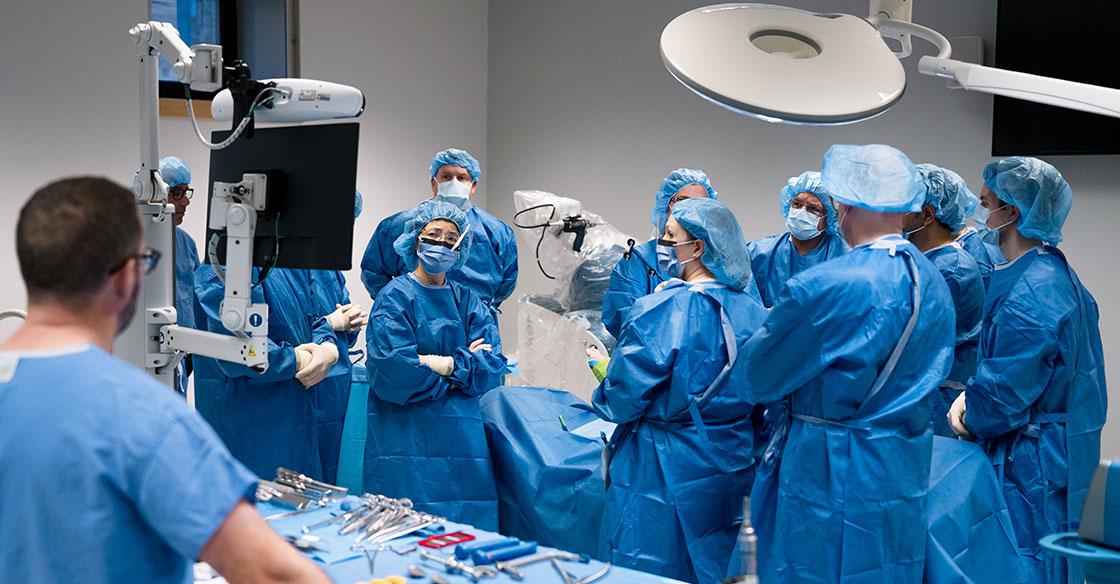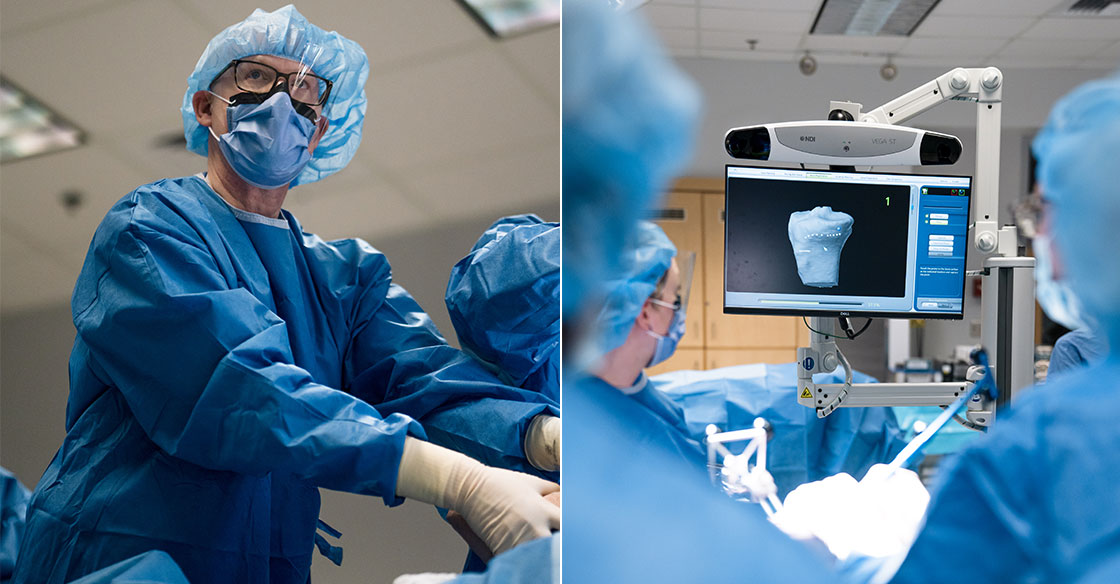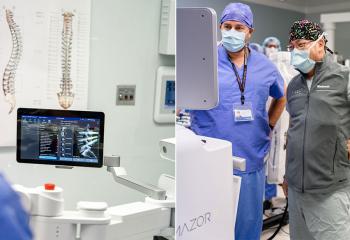
Pictured: A national, surgical skills training session was recently led by Dr. Mike Dunbar (QEII), Dr. Jennifer Leighton (Dartmouth General Hospital) and Dr. Glen Richardson (QEII) at the QEII Health Sciences Centre – reinforcing the hospital’s role as a national leader in robot-assisted surgeries. The technology utilized – an orthopaedic surgical robot dedicated to training and education – will be fully funded by the QEII Foundation.
In late-March, the QEII Health Sciences Centre once again made history by hosting a surgical skills training session with the QEII’s newest orthopaedic surgical robot; the Mako SmartRoboticsTM system that will serve as a national training robot for surgical teams here at home and those from across the country.
Surgeons from as far as Alberta travelled to the QEII for an introduction on robot-assisted orthopaedic surgery, including hands-on learning with the technology and clinical grade cadavers. In this case, observing robot-assisted knee and hip replacements.
The QEII is in the final stages of becoming Canada’s national surgeon certification centre for Mako SmartRobotics; a milestone that will see every surgeon in Canada using this technology trained and accredited through the QEII. The March training session was part of these ongoing efforts and expands upon previous QEII training opportunities with the Mako SmartRobotics system – ultimately building a national resident and learner program that will help recruit top-tier medical talent. The Nova Scotia Health program will also play a big role in helping other hospitals across Canada adopt this orthopaedic surgical robotics technology within their own provinces and jurisdictions.
The work is being supported and coordinated in partnership with the Nova Scotia Health Innovation Hub, which is leading the province’s strategic efforts in health innovation, and the scaling of advanced technologies like robotics. The Health Innovation Hub serves as a central access point for business development, partnership enablement, piloting new projects and the evaluation of surgical robotics across Nova Scotia.
By aligning clinical, academic and industry collaboration, the Health Innovation Hub ensures that robotic innovations improve patient care while collecting data and advancing research. It also provides streamlined oversight for robotics-related inquiries, expansion opportunities, reinforcing Nova Scotia’s position as a national leader in surgical robotics
From orthopaedics to cancer surgeries, the QEII is now home to six surgical robots; five of which are only a reality thanks to donor support through the QEII Foundation’s $100-million We Are campaign.
The newest addition to the QEII’s surgical fleet – the orthopaedic training robot – will see its technology fully funded by the QEII Foundation as part of its Centre of Excellence in Robotics project. With a laser focus on teaching, research and clinical use, this training robot will be a key driver in enhancing recruitment, retention and better patient outcomes. The ongoing fundraising initiative builds on investments by donors to originally bring the first orthopaedic robot to the Atlantic region and only the second in all of Canada. With more than 260 robotic surgeries performed to date with that donor-funded technology and with several world-leading orthopaedic surgeons at the helm, the QEII is ready to take its place as a national training and certification centre.

QUICK FACTS
- There are nine Mako SmartRobotics systems available within hospitals across Canada; three of them are in Nova Scotia and proudly supported by donors:
- two at the QEII Health Sciences Centre – including the region’s first orthoapedic surgical robot which arrived in November 2021 and the new, national training robot; and
- one at Dartmouth General Hospital.
- Since 2019, nearly 2,000 robot-assisted surgeries have been performed at the QEII across a variety of disciplines – including everything from gynecology and ear, nose and throat cancer surgeries to robot-assisted spinal fusions and partial knee replacements.
- The QEII is a proven leader in the space of surgical robotics, with industry partnerships in place that are setting global healthcare standards. QEII experts are not just users of the technology; they are active developers working side-by-side with industry to evaluate data sets, interpret machine learning, and inform how the technology is developed and introduced to other health centres from coast-to-coast.
- With a $20-million fundraising goal, the QEII Foundation’s Centre of Excellence in Robotics project will help establish the QEII as a world-leading and Canadian first Centre of Excellence in Robotics. This includes investing in research, artificial intelligence, virtual reality tools and best-in-class robotics technologies, like the Mako SmartRobotics system for national training.
- This Centre of Excellence in Robotics will elevate surgical innovation to new heights with more personalized surgery, increased accuracy, minimally-invasive procedures, and improved patient outcomes.
- The QEII Foundation is actively raising funds for this project and is proud to partner with the Nova Scotia Health Innovation Hub on this transformative initiative.
